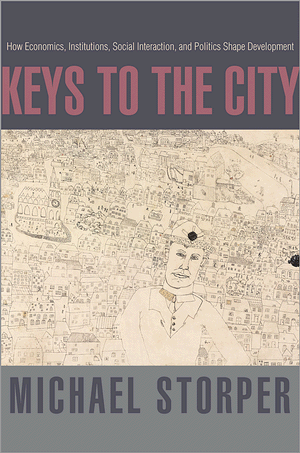Michael Storper published « Keys to the City: How Economics, Institutions, Social Interaction, and Politics Shape Development »
 Keys to the City: How Economics, Institutions, Social Interaction, and Politics Shape Development
Keys to the City: How Economics, Institutions, Social Interaction, and Politics Shape Development
by Michael Storper
May 2013, Princeton University Press
Why do some cities grow economically while others decline? Why do some show sustained economic performance while others cycle up and down? In Keys to the City, Michael Storper, one of the world’s leading economic geographers, looks at why we should consider economic development issues within a regional context–at the level of the city-region–and why urban economies develop unequally. Storper identifies four contexts that shape urban economic development: economic, institutional, innovational, interactional, and political. The book explores how these contexts operate and how they interact, leading to developmental success in some regions and failure in others. Demonstrating that the global economy is increasingly driven by its major cities, the keys to the city are the keys to global development. In his conclusion, Storper specifies eight rules of economic development targeted at policymakers. Keys to the City explains why economists, sociologists, and political scientists should take geography seriously.
Table of contents
Introduction
Michael Storper is professor of economic sociology at Sciences Po and professor of economic geography at the London School of Economics and Political Science and professor of urban planning and geography at the University of California, Los Angeles. He is the author of The Regional World: Territorial Development in a Global Economy. See his publications.
Endorsement:
« The Keys to the City demonstrates Storper’s considerable knowledge of the literature that intersects urban and spatial economics with the new economic geography. This engaging book will play a major role in moving theoretical discussions forward into new territory and will find a wide audience in economic geography and fields engaged in urban policy. »–Susan Christopherson, Cornell University
« Every chapter of this book makes a significant contribution to some aspect of economic development. However, this book is unique and ultimately invaluable because it is by a geographer who is engaging seriously with economics. It is a great entry into economics for geographers, is insightful throughout, and develops a new framework for thinking about places and growth. »–Gilles Duranton, University of Toronto
« Fascinating and ambitious, this book borrows ideas, concepts, and results from geographical economics, economic geography, and institutional social sciences to explain the organization of and the change in the space-economy. Exploring the unequal development of societies as they unfold across space, this book provides insightful analyses of issues that have been far too neglected. It will attract much attention. »–Jacques Thisse, Université catholique de Louvain
